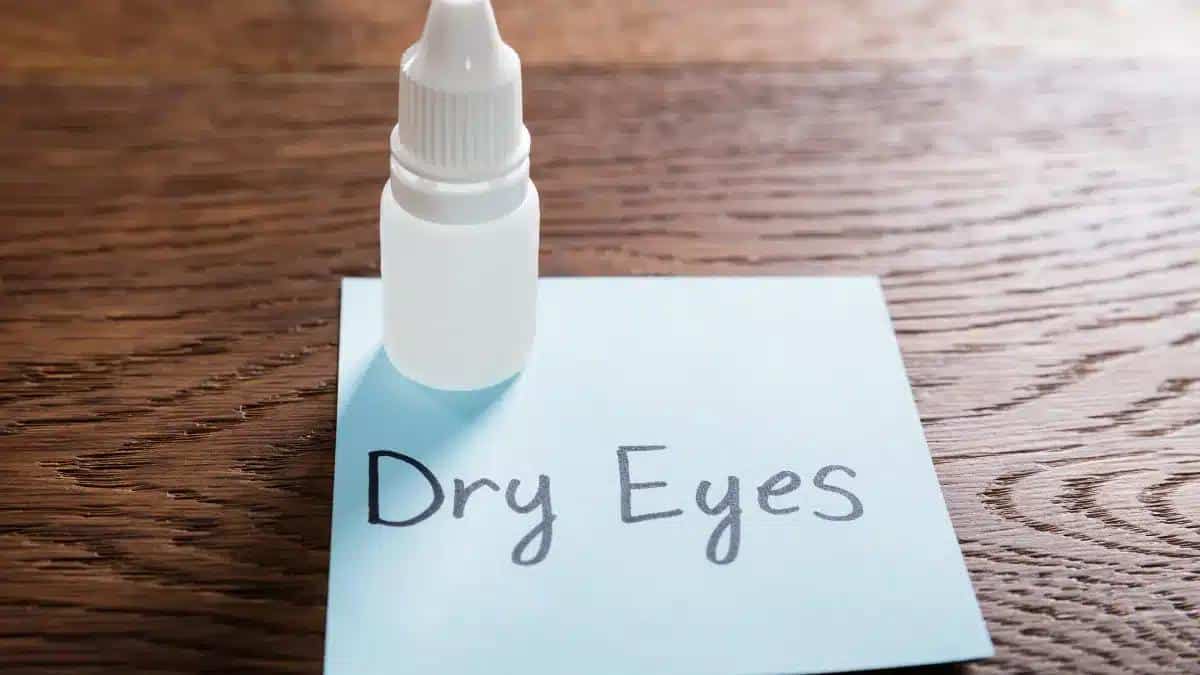Cataract surgery is a common and relatively risk-free treatment. However, like all surgeries, it may result in complications like Dry Eyes.
Dry Eyes is a common condition after Cataract surgery when the eyes are not able to produce enough tears or the tears evaporate quickly.
It’s usually temporary but may lead to discomfort because Dry Eyes can cause eye irritation and vision issues.
This article explains causes of Dry Eye after Cataract Surgery and the treatments available for it.
Causes of Dry Eyes after Cataract surgery
Dry Eye symptoms are common after Cataract surgery for a variety of reasons.
The surgical procedure or anesthesia can temporarily impair tear production, resulting in dryness.
In some individuals it may cause blurred vision and eye irritation, which can be painful.
According to a 2019 study, Dry Eye after Cataract surgery may occur as a result of:
- Decreased mucin production in the Eye
- Reduced time required for the tear film to break up due to surface roughness at the site of incision
- Using antibiotic and steroid eye drops for a long time
- Lower secretion of tears
- Tear film generation is reduced as a result of ocular irritation and light exposure
The severity of Dry Eye symptoms may also be affected by the type of Cataract surgery performed.
Dry Eye after Cataract surgery is usually temporary and does not result in chronic vision loss.
However, managing Dry Eyes symptoms as soon as possible is critical to minimize difficulties.
Contact your doctor immediately for a full evaluation and personalized treatment plan if you notice any symptoms.
Can Dry Eyes lead to Blindness? Explore the possibilities with our article: Can Dry Eyes Cause Blindness? Exploring the Facts
Symptoms of Dry Eye after Cataract surgery
Dry Eyes can have a significant influence on daily life as well as ocular health.
After undergoing Cataract surgery, patients may experience symptoms of Dry Eyes.
Some of the Dry Eye symptoms after Cataract surgery:
- Vision changes
- Red Eyes
- Burning sensation in the Eye
- Irritation
These symptoms are usually temporary and go away on their own. If they last for a long period, you should seek medical attention.
Apart from Cataract there are several other causes of Dry Eyes and explore these causes with our article: Common Dry Eye Causes and Effects
Treatments for Dry Eyes after Cataract surgery
Consult an eye surgeon if Dry Eye persists, worsens, or causes discomfort.
A doctor can provide appropriate Dry Eyes treatment or changes in post-surgery care to manage the condition.
You can opt for home remedies for Dry Eyes; these may include warm compresses, regular blinking exercises, and good hydration.
Using sunglasses to shield your eyes from the sun and blinking frequently may also help keep your eyes lubricated.
However, home remedies may not be very effective for Dry Eyes after Cataract surgery in critical cases.
If home remedies prove ineffective in managing Dry Eyes after Cataract surgery, several medical treatments are available.
Some of the medical treatments for Dry Eyes are:
- Artificial tears or lubricating eye drops
- Anti-inflammatory medications such as Cyclosporine to reduce eye surface inflammation
- Punctal plugs to keep tears longer on the Eye’s surface
- Specialized contact lenses designed for dry eye patients might be suggested to enhance comfort
It’s essential to consult an eye care professional to determine the most appropriate medical treatment.
Want to know more about the medications for Dry Eyes? Read our article: A Brief Guide to Dry Eye Medication

Summing up
It’s common to get Dry Eyes after Cataract surgery as the surgery has the potential to disturb the tear film, which lubricates the surface of your Eye.
Symptoms of Dry Eye after Cataract Surgery include redness, discomfort, and alterations in vision.
In most cases, keeping hydrated, blinking, and using artificial tears can help relieve dry eyes.
However, these may not be sufficient in severe cases of Dry Eyes.
Your doctor may recommend eye drops such as Cyclosporine to alleviate dry eyes by lowering inflammation.
If your symptoms persist for longer, it is best to get personalized guidance from your doctor.
Get to know it all about Dry Eye Allergy with our article: Understanding Dry Eye Allergy: Causes, Symptoms, and Treatment
Frequently Asked Questions
What causes Dry Eye Syndrome after Cataract surgery?
Post-Cataract surgery, Dry Eye Syndrome can occur due to changes in tear production and alterations in corneal sensitivity.
This is often a temporary issue that resolves as the Eye heals during the postoperative period.
Can I use eye drops after Cataract surgery?
Yes, using prescribed Eye drops after Cataract surgery is common and essential for healing.
These drops help reduce inflammation, preventing infection and promoting a smooth recovery for optimal vision restoration.
When should I consult my eye surgeon regarding persistent Dry Eye symptoms after Cataract surgery?
If you experience persistent or worsening Dry Eye symptoms, seeking medical attention is crucial.
Suppose the symptoms extend beyond the expected healing period. Consulting your eye surgeon for a thorough evaluation and appropriate treatment is essential in that case.
How long does Dry Eye last after Cataract surgery?
Dry Eye symptoms after Cataract surgery usually last a few weeks to a few months. However, each individual’s healing process may vary, and symptoms can improve during this postoperative period.
Can Dry Eyes after Cataract surgery affect my vision recovery?
Yes, severe Dry Eyes can temporarily affect vision recovery post Cataract surgery.
Using prescribed eye drops and following your surgeon’s recommendations can help manage this and support optimal vision restoration.
When referencing outside resources, GoodRxMedicine always provides full citations. To learn more about the measures we use to maintain the quality of our content, please review our Content Information Policy.















